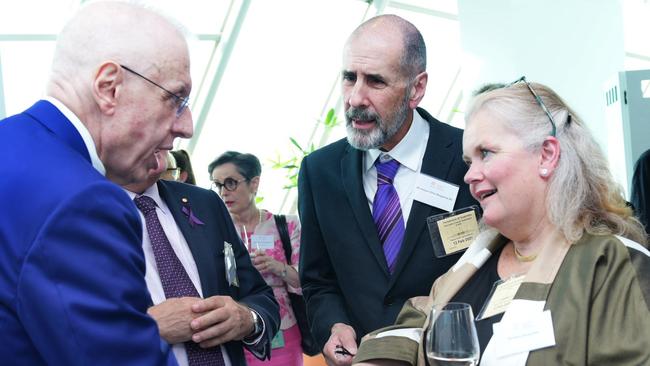Doctors bound by brilliance and devastating pancreatic cancer diagnosis
As two of the nation’s most prominent physicians, Chris Baggoley and Harry Nespolon share a unique but crushing bond.

As two of the nation’s most prominent physicians, Chris Baggoley and Harry Nespolon shared a unique bond.
The doctors attended the same medical school, became leading public advocates in the health sector and, last year, crushingly, were both diagnosed with the same insidious disease.
Dr Baggoley, Australia’s former chief medical officer, said he was attending a national health forum in Canberra in February when the Australian College of General Practitioners president confided that he too was fighting pancreatic cancer.
“I saw Harry towards the end of the day. He looked pale and he looked thin,” Dr Baggoley told The Weekend Australian.
“I sat down with him and we had a good chat and I was just shocked and horrified, which is often the reaction when people get pancreatic cancer, just to know that he’d been diagnosed.
“We had a chat that day, and the next day at the airport, and we exchanged texts with each other all the way up to the end.”
That came earlier this week, when Dr Nespolon died “peacefully in his sleep” in the early hours of Monday, just nine months after being diagnosed.
The 57-year-old has been remembered for his tireless dedication to helping others and expanding the national telehealth consultation system in response to the coronavirus pandemic despite his deteriorating health.
“What inspired me about Harry was that he didn’t give up work,” Dr Baggoley said. “He was having treatments and so on, but there were still things he wanted to do, things he wanted to achieve, particularly about COVID and the role of general practitioners.
“I was just so remarkably impressed by his presentation, his clarity, particularly knowing first-hand what he was going through.”
Dr Baggoley’s own experience with the disease began in January last year, when he was inadvertently diagnosed after having a CT scan for an unrelated condition.
It was an incidental discovery that could well have saved his life. Pancreatic cancer is particularly lethal — it is usually diagnosed late and kills early.
Less than 10 per cent of people who get it are expected to survive five years, and about 80 per cent succumb within six to 12 months of being diagnosed.
“It’s just such a subversive, unrelenting and unforgiving disease,” Dr Baggoley said. “When I was diagnosed, I actually had a doc looking for something quite different. I didn’t know that I had pancreatic cancer. But mine hadn’t spread so I was able to have a major operation.
“It’s called the Whipple procedure. That was then followed by six months of chemotherapy with a range of different drugs. There’s only about 10 per cent of people who are diagnosed with pancreatic cancer who are able to have that treatment.
“As I understand it, the five-year survival rate for someone in my position (having had the procedure) is about 30 per cent. So even though I was diagnosed with this wretched disease, I consider myself very lucky.”
A lifetime’s experience in breaking hard news to patients did little to prepare Dr Baggoley for telling his family about his own devastating diagnosis — and he credits their strength and support for fortifying his resolve to beat the disease.
“I have had my wife, Barbara, by my side for 43 years and she is so loving and dedicated. I can’t express my gratitude and love for her enough,” he said.
“It wasn’t easy telling her and, of course, it wasn’t easy telling our children, Patrick, Anna and Rosemary, either. But they’ve all been so incredibly supportive it sustains you, it really does.
“I know my future isn’t assured and I hope that I’ve got many, many days to appreciate them, but the potential for a limited outcome is ever present. So I’m so grateful for the time I do have to spend with them and to see my two granddaughters grow up.”
Dr Baggoley said he was also committed to helping raise awareness about the disease, and had joined the board of the Avner Pancreatic Cancer Foundation to help push for greater research.
“We talk about pancreatic cancer now being the third-highest cause of cancer deaths and that’s a ladder you don’t want to be climbing up,” he said.
“Bowel cancer is the second-highest, but you’ve got the bowel cancer screening program and, for a while as chief medical officer, my signature went out to thousands upon thousands of people, encouraging them to take the bowel cancer screening test.
“With breast cancer, we have the mammogram, and with prostate cancer, there’s the PSA test.
“What that shows is that, if there’s one thing that can make a difference in people’s experience of pancreatic cancer, it would be for more people to have the diagnosis early enough that they can get the best possible treatment, rather than palliative care.”




To join the conversation, please log in. Don't have an account? Register
Join the conversation, you are commenting as Logout